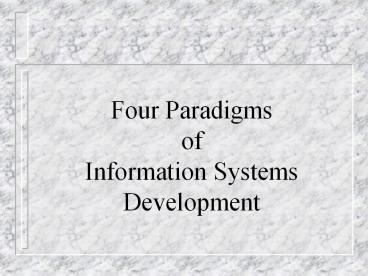Four Paradigms - PowerPoint PPT Presentation
Title:
Four Paradigms
Description:
Objectivism. Subjectivism. Functionalism. System Expert. Social Relativism. Facilitator ... Epistemological (Objectivism - Subjectivism) ... – PowerPoint PPT presentation
Number of Views:379
Avg rating:3.0/5.0
Title: Four Paradigms
1
Four Paradigms of Information Systems
Development
2
Epistemological Knowledge needed to design the
system
System Development
Ontological view of social technical world
3
Order
Functionalism System Expert
Social Relativism Facilitator
Objectivism
Subjectivism
Radical Structuralism Labor Partisan
Neohumanism Social Therapist
Conflict
4
Two types of assumptions about knowledge and the
world (Burrell and Morgan, 1979)
- Functionalism (Objective-order)
- Explain how individuals interact to form an
integrated whole. - Social Relativism (Subjective-order)
- Believe that social roles and
institutions exist as an expression of the
meanings - which men attach to their world
- Radical Structuralism (Objective-conflict)
- Focus on the structure and analysis of
economic power relationships. - Neohumanism (Objective-conflict)
- Focus on all forms of barriers to
emancipation and seek ways to overcome them.
5
Analyst Roles
- System Expert
- System developers take the objectives set
by managers and turn them into a - constructed products. Users operate the
system to achieve the goals. - Facilitator
- System developers are change agents who
help users make sense of the new - system and its environment. Users are
organizational agents. - Labor Partisan
- System developers choose between being an
agent for management or labor. - Owners are the beneficiaries of the system
while labor are the victim of system - rationalization.
- Social Therapist
- System developers attempt to draw together
the various stakeholders namely - customers, labor, and managers.
6
Differences in Developed Systems
- Technology architecture - the way in which
hardware and software are - matched with the organizational structure.
- Kind of information flows - intended meaning of
the information. - Control of users - how the system contribute or
reduce group power - over another.
- Control of systems development - locus of
influence over the - development process.
- Access to information - who would have access to
the information. - Error handling - the arrangement for detecting
errors. - Training - whether it enhances the social
position or mechanical skills. - Raison detre - the existence of the information
system.
7
Purpose and Rationale
Different assumptions
Epistemological Knowledge needed to design the
system
Different developed system
Ontological view of social technical world
8
Method, Design, Procedures
- Survey questions with rating scale.
- Epistemological (Objectivism - Subjectivism)
- Example Degree of user involvement in the
system development. - Who participate in the
development process? - Whose idea has the highest
influence in the process? - What are the methods in
gathering information needed for the process? - Ontological (Order - Conflict)
- Example Does the developers believe in
compromising? - Who should highly involve in
the development process? - What is the solution when there
is conflict between stakeholders?
9
Hypothesis
H0 There is no difference between the developed
system. H1 There is difference between the
developed system. Y f (X) Y Developed
System X Different set of assumptions. Subject
System developers Limitation The results can
not be applied generally.































